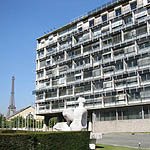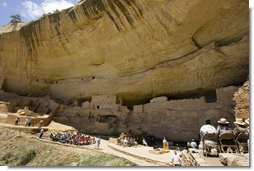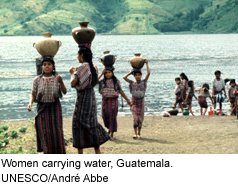
A session titled "
Whither UNESCO? Science, Poverty, and Peace" was held at the Annual Meeting of the American Association for the Advancement of Science (AAAS) in St. Louis on February 17, 2006. The session was organized by Irving Lerch, representing Americans for UNESCO. (
An audio tape of the session is soon to be available.)
The purpose of the meeting was described in the following Synopsis:
This is a critical time for UNESCO. The basic science and engineering program is being reorganized, increasingly complex issues in biomedicine are being scrutinized, and the member states are ordering their priorities placing greater emphasis on the devolution of programs away from the center and onto offices in geographically dispersed regions. U.S. State Department officials are trying to find ways to coordinate the participation of civil society with the work of the U.S. National Commission for UNESCO. The organization is being asked to place greater weight on science and engineering in the service of UNESCO's cross-cutting goals: poverty, conflict reduction, and social justice. The framework for these great works is being redeveloped to achieve greater efficiencies with a view to obtaining lasting and substantial results. UNESCO institutes, such as the Abdus Salam International Center for Theoretical Physics, have become important resources for the global science and engineering enterprise to recruit and develop scholars from developing countries and integrate them into the intellectual life of the global science and engineering community. The purpose of this symposium is to track these changes and to determine how best to organize U.S. participation to achieve global and national objectives.
The Discussion
John Daly opened the meeting, representing Dr. Lerch, who was unable to attend. He very briefly described Americans for UNESCO and the purpose of the session.
Laurel Baldwin-Ragaven served as moderator for the session, and began it with remarks as to interests of the AAAS and its Commitee for Sientific Freedom and Responsibility in unfettered collaboration across nations. She stressed the need for American scientists to participate in international scientific activities. Especially important is the role of American scientists in international advisory meetings held to interpret scientific knowledge for policy makers. She stressed the importance of scientific and academic freedom in such efforts.
Without the United States' scientific community, there is no UNESCO science program.
Andras Szolosi-Nagy
The View from UNESCO, Andras Szollosi-Nagy
This was a comprehensive and well-delivered talk on UNESCO's initiatives around the world dealing with accessing clean drinking water. Dr. Szollosi-Nagy recognized that most of the world will not achieve the Millennium Development Goals unless access to water is improved. Yet the world faces a looming crisis of lack of fresh water. Thus, UNESCO's scientific leadership in areas such as fresh water studies and analysis of the hydrological effects of climate change is critically important. Perhaps more so are UNESCO's efforts to help build capacity in developing nations to deal with these issues.
The speaker also made an appeal to the audience for U.S. scientists to engage directly with UNESCO programs. He stated that our most important challenge now is getting the U.S. intellectual community back and involved in UNESCO.
He described UNESCO's successful effort to create "
The Encyclopedia of Life Support Systems". This is an integrated compendium of sixteen encyclopedias, equivalent to 200 volumns, It attempts to forge pathways between disciplines in order to show their interdependence and helps foster the transdisciplinary aspects of the relationship between nature and human society. It deals in detail with interdisciplinary subjects, but it is also disciplinary as each major core subject is covered in great depth, by world experts. It is also online, free for use by the world's scientific community.
The View from the U.S. Government, Kelly Seikman
Reviewed the role of the
U.S. National Commission for UNESCO and highlighted the various ways that Americans can get involved with international exchange. She pointed out the newness of the situation--as well as the lack of history and continuity during the 19 year period in which the United States was not a member of UNESCO. Ms. Seikman also underlined the importance of the
U.S. Mission to UNESCO, located in Paris.
The talk focused briefly on the promotion by the United States of cross-cutting programs at UNESCO, and the importance of the current reviews of UNESCO's programs in the natural and social sciences.
UNESCO staff of international civil servents is intended to include representatives of all its member nations. The nominal number of U.S. staffers should be between 46 and 76. However, in March there were only 32 full time U.S. staff members. The State Department is seeking to encourage other U.S. citizens on the staff.
The Role and Viewpoint of the National Academies, Bruce Alberts
Dr. Alberts described the international programs of the U.S. National Research Council, and notably those of the InterAcademy Council formed as an international coalition of national academies. He ended his talk with what he felt should be the priorities for UNESCO from his perspective as someone concerned with science education and Inter Academy collaboration to address global challenges. (Since the presentation is available on the web, it will not be further mentioned here.)
The Role and Expectation of the Learned and Professional Societies, Rita Colwell
Dr. Colwell "spoke from the heart," touching on her own personal experiences of having worked for more than 25 years internationally, putting a developing world perspective on stretching minimal funds to maximal effect. She emphasized the need for scientist to scientist cooperation. She described the importance of the UNESCO sponsored MIRCEN program, an international network in microbial biology, in catalyzing such cooperation.
Approximately 35 to 40 people attended the session. It concluded with questions from the floor and responses from the panelists.
 Participants
Participants
Laurel Baldwin-Ragaven (Moderator), Henry R. Luce Professor of Health and Human Rights, Trinity College, and current Chair of the AAAS Committee on Scientific Freedom and Responsibility.
Andras Szollosi-Nagy (Speaker), Deputy Assistant Director for Natural Sciences, UNESCO.
Kelly Seikman, (Speaker) Ms. Seikman spoke in place of Marguerite Sullivan, Department of State and Director of the U.S. National Commission for UNESCO. (Ms. Sullivan was unable to attend the session due to illness.)
Bruce Alberts (Speaker), University of California, San Francisco (Former President of the National Academy of Sciences)
Rita Colwell (Speaker), University of Maryland and Canon U.S. Life Sciences Inc. (Former President of the National Science Foundation)
John Daly, Board of Directors, Americans for UNESCO






